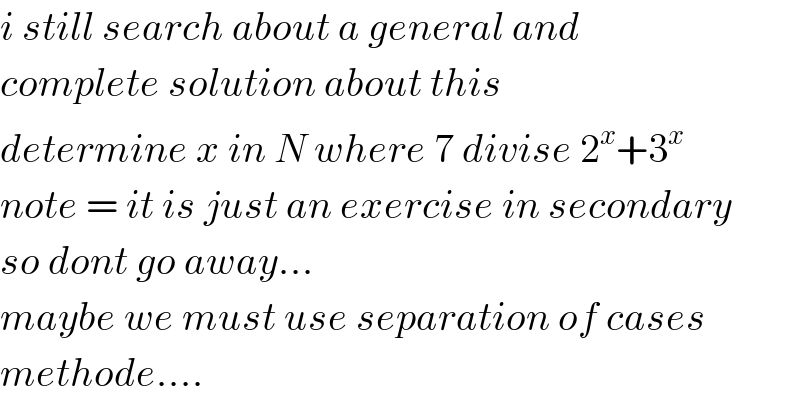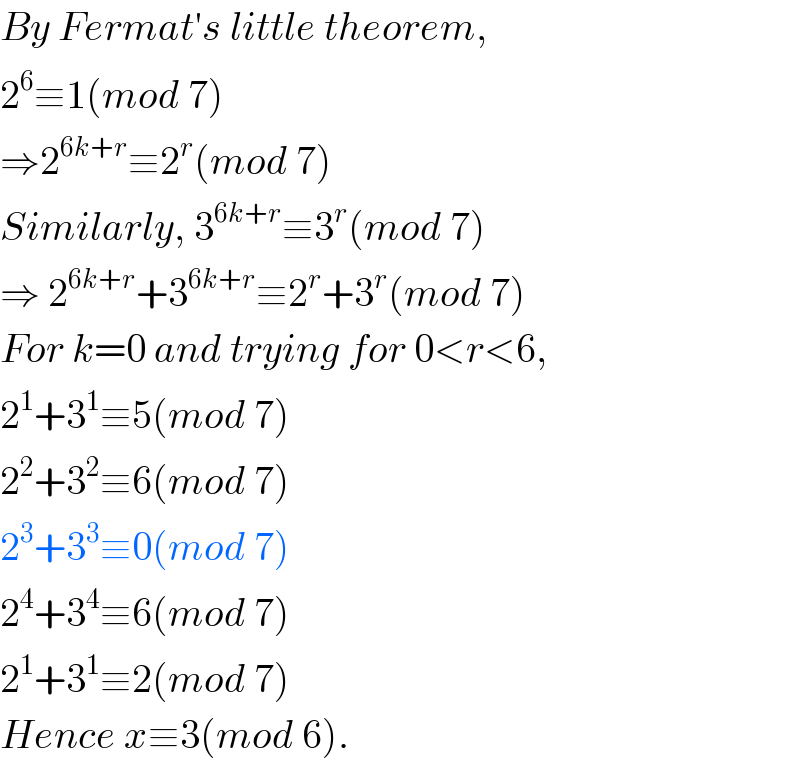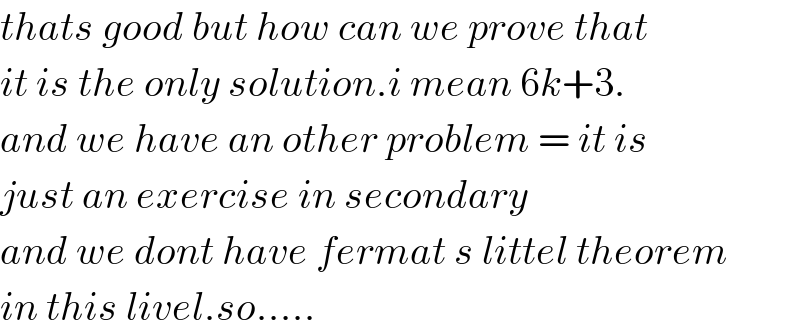Question Number 21990 by hi147 last updated on 08/Oct/17

$${i}\:{still}\:{search}\:{about}\:{a}\:{general}\:{and}\: \\ $$$${complete}\:{solution}\:{about}\:{this} \\ $$$${determine}\:{x}\:{in}\:{N}\:{where}\:\mathrm{7}\:{divise}\:\mathrm{2}^{{x}} +\mathrm{3}^{{x}} \\ $$$${note}\:=\:{it}\:{is}\:{just}\:{an}\:{exercise}\:{in}\:{secondary} \\ $$$${so}\:{dont}\:{go}\:{away}… \\ $$$${maybe}\:{we}\:{must}\:{use}\:{separation}\:{of}\:{cases} \\ $$$${methode}…. \\ $$
Commented by Tinkutara last updated on 11/Oct/17

$$\mathrm{I}\:\mathrm{got}\:{x}\:\equiv\:\mathrm{3}\:\left(\mathrm{mod}\:\mathrm{6}\right).\:\mathrm{Is}\:\mathrm{this}\:\mathrm{true}? \\ $$
Answered by Tinkutara last updated on 11/Oct/17

$${By}\:{Fermat}'{s}\:{little}\:{theorem}, \\ $$$$\mathrm{2}^{\mathrm{6}} \equiv\mathrm{1}\left({mod}\:\mathrm{7}\right) \\ $$$$\Rightarrow\mathrm{2}^{\mathrm{6}{k}+{r}} \equiv\mathrm{2}^{{r}} \left({mod}\:\mathrm{7}\right) \\ $$$${Similarly},\:\mathrm{3}^{\mathrm{6}{k}+{r}} \equiv\mathrm{3}^{{r}} \left({mod}\:\mathrm{7}\right) \\ $$$$\Rightarrow\:\mathrm{2}^{\mathrm{6}{k}+{r}} +\mathrm{3}^{\mathrm{6}{k}+{r}} \equiv\mathrm{2}^{{r}} +\mathrm{3}^{{r}} \left({mod}\:\mathrm{7}\right) \\ $$$${For}\:{k}=\mathrm{0}\:{and}\:{trying}\:{for}\:\mathrm{0}<{r}<\mathrm{6}, \\ $$$$\mathrm{2}^{\mathrm{1}} +\mathrm{3}^{\mathrm{1}} \equiv\mathrm{5}\left({mod}\:\mathrm{7}\right) \\ $$$$\mathrm{2}^{\mathrm{2}} +\mathrm{3}^{\mathrm{2}} \equiv\mathrm{6}\left({mod}\:\mathrm{7}\right) \\ $$$$\mathrm{2}^{\mathrm{3}} +\mathrm{3}^{\mathrm{3}} \equiv\mathrm{0}\left({mod}\:\mathrm{7}\right) \\ $$$$\mathrm{2}^{\mathrm{4}} +\mathrm{3}^{\mathrm{4}} \equiv\mathrm{6}\left({mod}\:\mathrm{7}\right) \\ $$$$\mathrm{2}^{\mathrm{1}} +\mathrm{3}^{\mathrm{1}} \equiv\mathrm{2}\left({mod}\:\mathrm{7}\right) \\ $$$${Hence}\:{x}\equiv\mathrm{3}\left({mod}\:\mathrm{6}\right). \\ $$
Commented by hi147 last updated on 16/Oct/17

$${thats}\:{good}\:{but}\:{how}\:{can}\:{we}\:{prove}\:{that} \\ $$$${it}\:{is}\:{the}\:{only}\:{solution}.{i}\:{mean}\:\mathrm{6}{k}+\mathrm{3}.\: \\ $$$${and}\:{we}\:{have}\:{an}\:{other}\:{problem}\:=\:{it}\:{is} \\ $$$${just}\:{an}\:{exercise}\:{in}\:{secondary} \\ $$$${and}\:{we}\:{dont}\:{have}\:{fermat}\:{s}\:{littel}\:{theorem} \\ $$$${in}\:{this}\:{livel}.{so}….. \\ $$
